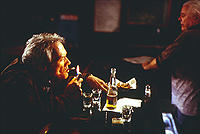
Believe me, I've got a nose for a good movie, and this one
stuffs my nostrils. Clint is still busy chasing skirt and, at age
67, it might thrill the grannies in the audience, but others will
wonder what it is that makes him more appealing than, say, a
Brad Pitt, a Johnny Depp, or even a Viggo Mortensen.
Nevertheless, let's get on about the "True Crime" which is the
substance of the movie.
True Crime:
photo: Sam Emerson
© 1999 by Warner Bros.

|
Steve Everett (our man Clint) is a known womanizer and
alcoholic (no wonder with scripts like this one). He's got
problems (no kidding!) An ace reporter, he was recently fired
from The New York Times (anyone surprised?) for following
the trail of a story which involved certain people in power who
didn't appreciate his journalistic technique and so crushed him
like a bug. Friend and colleague, editor-in-chief Alan Mann
(James Woods) has rescued what there is left of Everett's life
by offering him a position on the Oakland Tribune. Steve
spends his free time in recognizable fashion by bedding the
ladies, including the wife of city-editor Bob Findley (Denis
Leary). Needless to say, Findley would like to see the rear end
of Everett on the rubbish heap as soon as possible. Instead of
using a direct approach, the city-ed has decided to offer this
rival enough rope in the form of a simple assignment: he has to
pen a human interest angle on the imminent execution of a
death sentence, but will undoubtedly wind up pursuing the story
behind the story that usually entices him. (Let us also take
note that Everett's wife is also more than slightly pissed off with
her husband's extracurricular activities.)
The original reporter on the story died the evening before in a
car accident (after refusing to go to bed with our main man).
No sooner can you say "There's something rotten in the state
of California" than Everett's off and running to follow his nose
again toward another far-fetched case of injustice that seems
all-too-clear to his sober senses (Of course, that could simply
be a side-effect of withdrawal symptoms). Everett takes up
arms and, after pursuing several other channels open to him for
gathering information pertinent to the case (at least in Steve's
mind), finally gets around to interviewing the convicted
murderer Frank Beachum (Isaiah Washington). It is
immediately obvious to the viewer that Beachem could never
possibly be guilty, for three obvious reasons:
1) he has big, beautiful eyes
2) all this suffering and hopelessness couldn't be the penalty for a true criminal and
3) the film has to have a story that will last through more convolutions.
Everett is a damned good reporter, and he knows he's on to
something when he finds out that they moved the potato chips.
His relentless pursuit of the truth winds up making him view life
once again through an alcoholic haze where (who knows?) he
might find an answer. Time is his enemy, however (although
you might not think so to look at the women around him), and
he only has 24 hours to save the life of a (possibly) innocent
man. Will our hero succeed? Will the dead-man-walking be
pumped up with more than volume? Will justice prevail? Will
Christmas be a holiday this year?
This is Eastwood's 21st film as director (in his 41st starring
role) and, although it will probably be a financial success, is of
a much lower artistic caliber than something like "Bird,"
"Midnight in the Garden of Good and Evil," or "The Bridges of
Madison Country." One wonders, considering he has such
talent in so many ways, why he bothers with this kind of
material. If this kind of Eastwood movie fare continues, he
might wind up as the Truly Unforgiven. On the other hand, one
could also easily view it with the response offered by the end-
credits song: "Why Should I Care?"
In the meantime, where's my favorite crayon?
© 1994-2006 The Green Hartnett
|
